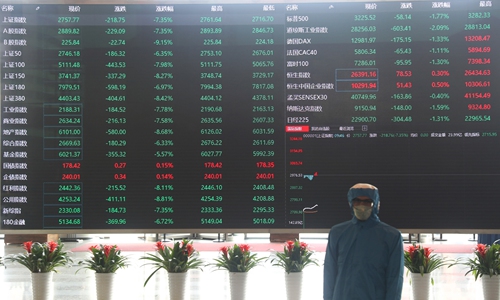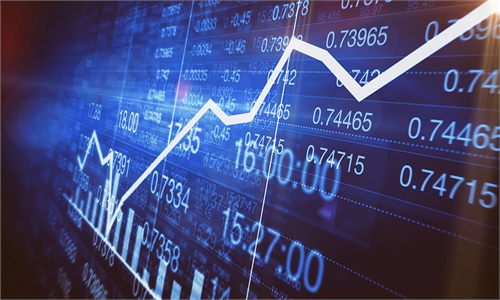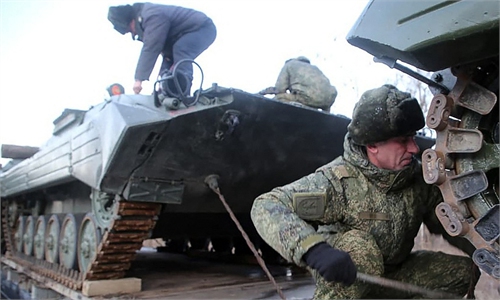
China's A-share market reopens on Monday, its first trading day of the Year of the Rat, losing heavily across the board. Photo: CNS Photo
Chinese mainland stocks plunged on Thursday, as a decline in global capital markets reverberated through Asian markets following the launch of military operation by Russia in Ukraine on Thursday. However, declines on the A-share market were significantly milder than that of global markets, highlighting the resilience of China's capital market, analysts noted.
Apart from a few sectors such as energy stocks, almost all stock types dived on mainland markets, with nearly 4,000 stocks falling and more than 30 them plunging by the trading limit of 10 percent.
The benchmark Shanghai Composite Index slumped by 1.7 percent to 3,429.96 points, while the smaller Shenzhen Component Index shrank by 2.20 percent to 13,252.24 points. The tech-heavy ChiNext board slipped by 2.11 percent to 2,783.90 points.
The Hong Kong market recorded an even sharper decline, with the benchmark Hang Seng Index slipping by 3.21 percent to 22,901.56 points.
The mainland and Hong Kong markets' slide was primarily brought about by a nosedive on the global capital markets both overnight and in recent hours. European stock futures reported sharp losses when bourses opened on Thursday, with the Euro Stoxx 50 futures shedding 4.7 percent, while the German Dax futures fell by more than 5 percent, while FTSE futures were down 3 percent.
In the US overnight, the Dow Jones Industrial Average fell 1.4 percent, while the technology-heavy NASDAQ Composite retreated 2.6 percent, its lowest closing level since May.
"The decline on A-share and Hong Kong stock markets was mostly due to the aftermath of Russia-Ukraine military operation… No stock markets will be immune to the blow from such military conflict, as it will bring huge negative impact on global economy and finance," veteran financial commentator Zhao Qingming told the Global Times on Thursday.
However, a few sectors still swam against the stream and edged up on mainland markets on Thursday. Oil and natural gas exploitation stocks edged up by 1.34 percent; military defense stocks also once jumped up after the morning session.
According to Zhao, the surge of oil and natural gas stocks was mostly due to market expectations for rising prices, as potential Western sanctions on Russian energy exports would lead to a big gap in global crude and natural gas supplies, shoring up prices of those commodities.
"For Chinese oil companies, rising commodity price would also bring some bonuses, as their crude stocks or long-term futures contracts mean that they can get higher profits through selling oil at higher prices," Zhao said.
On Thursday, the Brent crude crashed through $100 a barrel for the first time since mid-2004, while US light crude soared to $97.51 a barrel, up $5.4.
Stock commentator Li Daxiao also told the Global Times that although A-share markets have been pushed down by external factors, they have been "relatively" stable compared with overseas markets with a milder decline and signs of stability approaching at the end of the trading session.
"A-share markets' performance on Thursday still shows its resilience," he said, adding that forces still exist to stabilize the mainland markets.
Global Times



